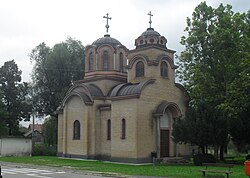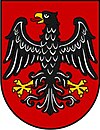Donji Lapac
|
Donji Lapac Доњи Лапац (Serbian) |
||
|---|---|---|
| Municipality | ||
| Donji Lapac Municipality Općina Donji Lapac |
||

Orthodox church of Pentecost in Donji Lapac
|
||
|
||
| Location of Donji Lapac in Croatia | ||
| Coordinates: 44°33′16″N 15°57′33″E / 44.55444°N 15.95917°ECoordinates: 44°33′16″N 15°57′33″E / 44.55444°N 15.95917°E | ||
| Country |
|
|
| County | Lika-Senj | |
| Government | ||
| • Mayor | Dušan Šijan (SDP) | |
| Area | ||
| • Total | 353 km2 (136 sq mi) | |
| Population (2011) | ||
| • Total | 2,113 | |
| Time zone | CET (UTC+1) | |
| • Summer (DST) | CEST (UTC+2) | |
| Website | www |
|
Donji Lapac (Serbian Cyrillic: Доњи Лапац) is a settlement and a municipality in Lika, Croatia.
Donji Lapac is located a region of eastern Lika called Ličko Pounje, by the river Una that flows near the town in the valley between mountain Plješevica and Una on the altitude of 582 m. It is connected with the road that connects Bihać with Gračac.
The area of Donji Lapac has been inhabited since the Iron age, which many material remains prove. During medieval times the area of Lapac was part of old-Croatian Lapac župa and in 1449 it became possession of Frankopans. Old city Lapac was located on a nearby Obljaj hill (666 m) south from Donji Lapac. When in 1528 Ottomans conquered Lika, Lapac was absorbed.
Donji Lapac was founded in 1791, in the year the Austro-Ottoman war ended and Eastern Lika was annexed by Habsburg empire as a frontier post. In the late 19th century and early 20th century, Donji Lapac was a district capital in the Lika-Krbava County of the Kingdom of Croatia-Slavonia. In 1941 Yugoslav partisans liberated the district center.
During the Croatian War of Independence, Donji Lapac was incorporated along with other towns into the unrecognized breakaway Republic of Serbian Krajina. In August 1995, it was returned to Croatian control following victories by the Croatian army. According to the International Criminal Tribunal for the former Yugoslavia, the Croatian conquest of the municipality was accompanied by widespread looting and ethnic cleansing by the Croatian forces, including the murder of four elderly civilians in the municipality of Donji Lapac, crimes which formed part of the indictment and conviction of the Croatian general Ante Gotovina and Mladen Markač.
...
Wikipedia


